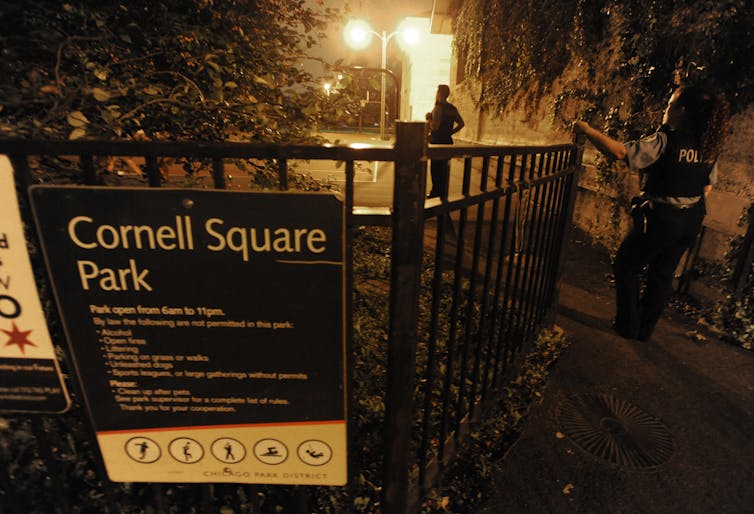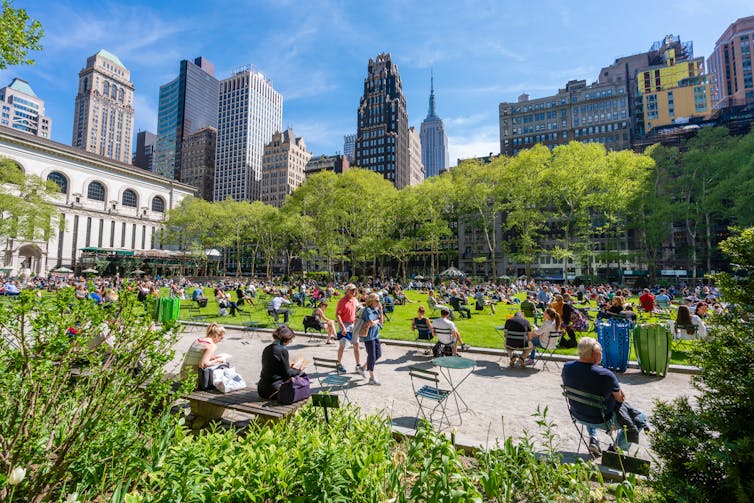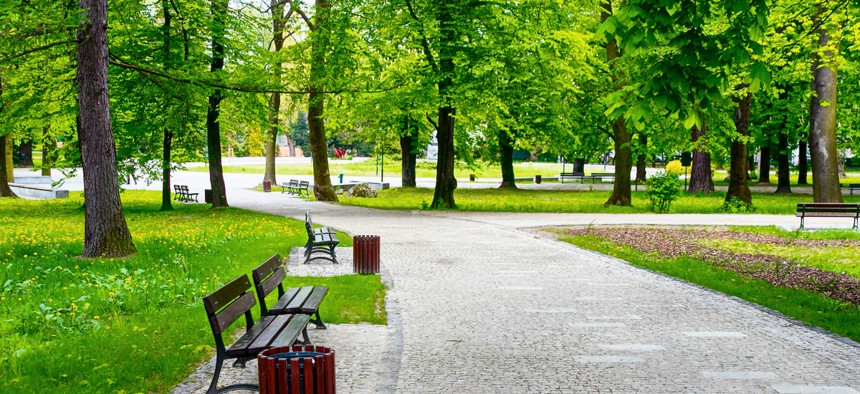Connecting state and local government leaders
The short answer: It depends on the park.
The relationship between parks and crime remains the subject of debate.
Some scholars say parks and other urban green spaces prevent violence. When vacant lots and deteriorating urban spaces are transformed into more appealing and useful places for residents, violence and crime typically decline in the immediate vicinity.
In a study of public housing developments in Chicago, researchers found 52% fewer crimes reported near buildings surrounded by trees and other vegetation. In New York City, neighborhoods with higher investment in public green space see an average of 213 fewer felonies per year.
Similar relationships between green space and crime have been observed in Baltimore, Chicago, Philadelphia and Portland, as well as in cities outside the U.S.
In many cities, however, people see parks as dangerous – magnets for illicit activities like drug dealing and places for criminals to access potential victims who, while engaged in recreation, may be less vigilant about their belongings and personal safety.
Research supports this idea, too. One 2015 study of multiple U.S. cities found that property crime rates are two to four times higher in neighborhoods near parks. Violent crimes rates were up to 11 times worse.
So do parks make cities safer or more dangerous? The short answer is: It depends on the park.
Green Space Leads to Lower Crime
One reason that evidence on the relationship between parks and crime is so mixed is that most studies on this subject have focused on a single city or location.
In an effort to identify nationwide trends, our team of researchers at Clemson and North Carolina State universities in 2017 began gathering information on crime, green space and parks in the 300 largest cities in the United States.
Unlike many studies that use the terms “parks” and “green space” interchangeably, our analysis distinguished between these two urban environments.
Green space was measured by the amount of grass, plants, tree canopy cover and other greenery on the landscape. We defined urban parks as designated open spaces managed by a public agency – a subset of green space.
To distinguish the impact of green spaces from social factors typically linked to crime – population density, income, education, diversity and social disadvantage – we controlled for those factors when evaluating crime data.
We learned that more green space was associated with lower risk of crime across neighborhoods in all 300 cities we studied.
Burglaries, larceny, auto theft and other property crimes occur less often in greener neighborhoods in every city in our sample. Violent crimes like murder, assault and armed robbery were also less common in greener neighborhoods in nearly all the cities we studied.
Only three cities in our sample did not benefit from green space. In Chicago, Detroit and Newark – all places with notoriously high and stubborn crime rates – more green space was associated with higher levels of violent crime.
Scholars have identified several reasons why the presence of green space may lead to lower crime.
Contact with nature reduces precursors to crime like stress and aggression, making people feel happier and less inclined to engage in criminal acts. By giving people a place to participate in outdoor activities together, parks also promote positive social interactions and neighborly connections within diverse urban communities.
And when people gather in parks and other green spaces, it puts more “eyes on the streets,” exposing criminals to constant community surveillance.
Finally, there’s some evidence that more green space makes nearby areas safer simply by pushing crime into nearby neighborhoods – not outright eliminating it.

Parks: Crime Hot Spots or Safe Havens?
In the second step of our study, we narrowed the focus of our analysis to just urban parks. The results were less positive.
Examining four cities in different U.S. regions – Austin, Philadelphia, Phoenix and San Francisco – we found that violent crime was 28% to 64% higher in neighborhoods adjacent to parks than in neighborhoods located a mile from the same parks. Property crime was 38% to 63% higher in areas close to parks.
The only exception was Phoenix, where proximity to parks had no impact on property crime.
Zooming out from our four-city sample, we found evidence that some parks actually do a good job of deterring crime. Design and maintenance are critical if parks are to reduce, rather than attract, crime.
New York’s Bryant Park, in Midtown Manhattan, was once a notorious haven for criminal activity – a place office workers avoided walking through after dark. In 1985 Bryant Park was closed for a massive renovation effort that included the addition of activities and events there. When it reopened in 1992, police reported a 92% decrease in local crime.

In Los Angeles, a citywide Summer Night Lights program started in 2007 to promote positive activities in parks after dark is credited with reducing crime in nearby neighborhoods by 40% over three years.
And construction of a new elevated trail in Chicago seems to have made the neighborhoods it runs through safer. Between 2011 and 2015, areas on The 606 trail saw 2.8 times less violent crime and 1.6 times less property crime than comparable low-income Chicago neighborhoods over the same period.
Parks that are designed for safety, heavily programmed on an ongoing basis and well maintained tend to attract residents whose presence serves as a crime deterrent.
That means not just amenities like ball fields and cultural facilities but also the active involvement of the local community and sources of sustainable, ongoing funding. When parks are allowed to deteriorate, the decaying infrastructure and bad reputation of parks can turn them into magnets for crime.
Critically, both program and landscape design must also reflect the broader community in which a park sits, creating public spaces where everyone from office workers to local teens can appreciate and enjoy the entire range of social, economic and health benefits that parks offer.
More legitimate park users means increased monitoring and sense of ownership over a public space. This process known as “territorial reinforcement” is a key tenet of crime prevention through environmental design.
Urban parks and green space enhance the well-being of city residents, promoting physical activity, mental health and a sense of community.
Whether they also reduce crime depends on the park, city, the neighborhood and, critically, how well an urban green space is managed.
This article is republished from The Conversation under a Creative Commons license. Read the original article.
Lincoln Larson is an assistant professor at North Carolina State University. S. Scott Ogletree is a PhD candidate and researcher in parks and conservation at Clemson University.

NEXT STORY: Wisconsin Supreme Court Says School Policy Subject to Governor’s Approval



